Index relies entirely on the support of donors and readers to do its work.
Help us keep amplifying censored voices today.
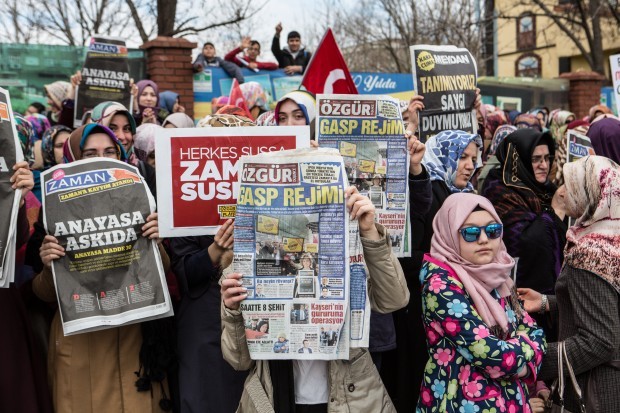
Thousands gather in solidarity outside Zaman offices in Istanbul on 5 March 2016. Credit: photo story / Shutterstock
This column was originally submitted to Today’s Zaman, but was rejected by the new management. Yavuz Baydar was a columnist for Today’s Zaman since its launch on 15 January 2007
Following the presidential attacks on Turkey’s top judicial body, the Constitutional Court, stemming from its pro-freedom ruling over the case of Can Dündar and Erdem Gül of Cumhuriyet, and the unplugging two opposition channels from Türksat satellite, the dramatic seizure of Zaman and this newspaper, Today’s Zaman, both highly influential in their own ways, is one of the final nails in the coffin of journalism in Turkey.
Any other attempt to blur the discussion, or to divert the attention elsewhere, as “none of this has to do with journalism” is sheer nonsense, serving the government’s interests.
Neither is there any doubt that there is absolutely no difference at all in the huge mess of media crackdown in Turkey, in essence, say, between Cumhuriyet and Zaman, or Kurdish IMC-TV or right-wing/nationalist Bengü TV.
“Erdogan’s crusade is not just against a specific group or ideology. Whoever dares to criticise him is a potential target. After the fall of the largest critical newspaper Zaman, it is now even harder to speak about media freedom in Turkey,” wrote my esteemed colleague, Selçuk Gültaşlı, a veteran correspondent with Today’s Zaman, in Brussels.
As with much else directed at outlets and individuals in various, often opposing parts of the Turkish media, the legal basis for the seizure is, to say the least, is not “convincing”.
As the editorial by the Platform for Independent Journalism, P24 pointed out yesterday:
“It is no secret that Zaman demonstrated fidelity to the movement associated with the exiled cleric, Fethullah Gülen. The paper once supported the rise of AKP but in recent years has been a bitter critic. The legal document, which placed Zaman’s parent company into court-appointed administration, relies on the testimony of an anonymous witness who maintains that the editorial policy was dictated by what it calls the Fethullah Terror Organisation (FETÖ in its Turkish acronym). This, in turn, is guilty of conspiring with the outlawed PKK. It is enough to point out that the existence of FETÖ is at best hearsay, at worst the invention of subeditors in the pro-government press – never mind that Zaman itself once took a more hawkish line towards the PKK than the government itself.”
There seems to be absolutely no doubt, either, what the most serious and most respected international news outlets see behind the attempts to completely silence what remains of critical media segments of Turkey, regardless of their political inclinations and editorial lines.
“If the Zaman affair were the only example of the mistreatment of the media in Turkey, it might be seen as part of the murky struggle between the AKP and Hizmet,” The Guardian wrote in its editorial. “But that is far from the position. Journalists of every kind are routinely intimidated, threatened with legal action and detained. Publications and broadcasting organisations have been put under extreme pressure to sack columnists whom the government dislikes. Some have been bought out by businessmen close to the government.”
“The editor-in-chief of the opposition paper Cumhuriyet and its Ankara bureau chief were charged with espionage after the paper printed a story suggesting that the government was conniving at the supply of arms to extremist rebels in Syria. When the country’s highest court ordered their release pending trial, Mr Erdoğan, with typical disregard for the legal system, announced: “I do not abide by the decision or respect it.”
“… Mr Erdoğan’s personality is not suited to any kind of adversity. The increasingly frequent use of a law making it an offence to insult the president shows him at his most thin-skinned…. Whether in dealing with the media or the courts, or even with the public, Mr Erdoğan’s message seems to be the same: there will be consequences if you cross me. This is not mature politics and it is certainly not democratic.”
Not much more to add.
The seizure of Zaman and TZ, along with the preceding series of attacks on the press from all possible fronts, has left Turkish journalism in a wreck. A key profession is now on its death-bed, mourned desperately by its courageous devotees. The “civilized world” just watches, as the dreams of a Turkish democracy passes away along with it.

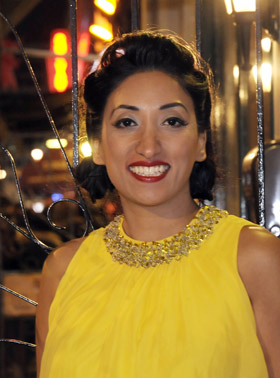
Outspoken and irreverent comic and writer Shazia Mirza will host the 2016 Freedom of Expression Awards Gala on 13 April.
From a journalist who trains women to tell the story of Syria’s civil war and a comedian who uses her routines to campaign for women’s rights in Indonesia, to a women-led campaigning group taking on the fight against internet censorship in Pakistan, the shortlist for the 2016 Index on Censorship Freedom of Expression Awards showcases women with leadership and bravery.
On International Women’s Day we celebrate the amazing women on our shortlist.
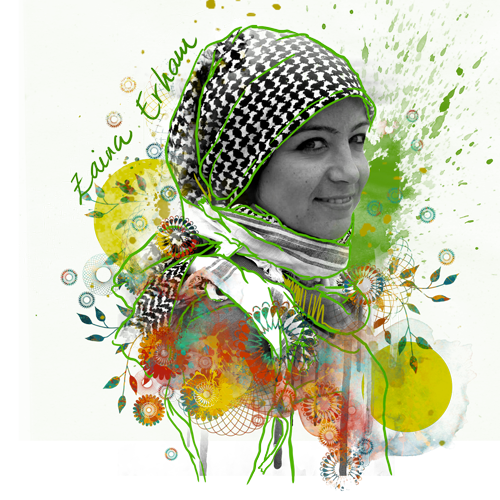 While many fled, Syrian-native journalist Zaina Erhaim returned to her war-ravaged country in 2013 to ensure those left behind were not forgotten. She is now one of the few female journalists braving the twin threat of violence from both IS and Syrian president, Bashar al-Assad.
While many fled, Syrian-native journalist Zaina Erhaim returned to her war-ravaged country in 2013 to ensure those left behind were not forgotten. She is now one of the few female journalists braving the twin threat of violence from both IS and Syrian president, Bashar al-Assad.
 Arts nominee Sakdiyah Ma’ruf is a stand-up comedian from Indonesia whose routines challenge Islamic fundamentalism. Born to a conservative Muslim family in Java, Ma’ruf went against her father’s wishes and started using comedy to speak about religious-based violence and extremism, ethnic extremism and xenophobia, as well as fear, terror and violence against women.
Arts nominee Sakdiyah Ma’ruf is a stand-up comedian from Indonesia whose routines challenge Islamic fundamentalism. Born to a conservative Muslim family in Java, Ma’ruf went against her father’s wishes and started using comedy to speak about religious-based violence and extremism, ethnic extremism and xenophobia, as well as fear, terror and violence against women.
 Artist Tania Bruguera was arrested after an attempt to stage her performance piece #YoTambienExijo in Havana in late 2014. Mounted soon after the apparent thaw in US-Cuban relations, Bruguera’s piece offered members of the public the chance of one minute of “censor-free” expression in Havana’s Plaza de la Revolución.
Artist Tania Bruguera was arrested after an attempt to stage her performance piece #YoTambienExijo in Havana in late 2014. Mounted soon after the apparent thaw in US-Cuban relations, Bruguera’s piece offered members of the public the chance of one minute of “censor-free” expression in Havana’s Plaza de la Revolución.
 Campaigning nominee nineteen-year-old Vanessa Berhe continues to fight for the release of her uncle, journalist Seyoum Tsehaye, who has been imprisoned in Eritrea for the last 15 years. She also launched the campaign Free Eritrea to draw the world’s attention to a little-reported country with one of the worst track records for free speech.
Campaigning nominee nineteen-year-old Vanessa Berhe continues to fight for the release of her uncle, journalist Seyoum Tsehaye, who has been imprisoned in Eritrea for the last 15 years. She also launched the campaign Free Eritrea to draw the world’s attention to a little-reported country with one of the worst track records for free speech.
 Lina Attalah, chief editor, is just one of the women and men — friends and journalists — who in 2013 founded an independent news collective Mada Masr after newspaper Egypt Independent was censored into bankruptcy. Mada Masr was launched as a media co-operative that aims to hold those in power accountable.
Lina Attalah, chief editor, is just one of the women and men — friends and journalists — who in 2013 founded an independent news collective Mada Masr after newspaper Egypt Independent was censored into bankruptcy. Mada Masr was launched as a media co-operative that aims to hold those in power accountable.
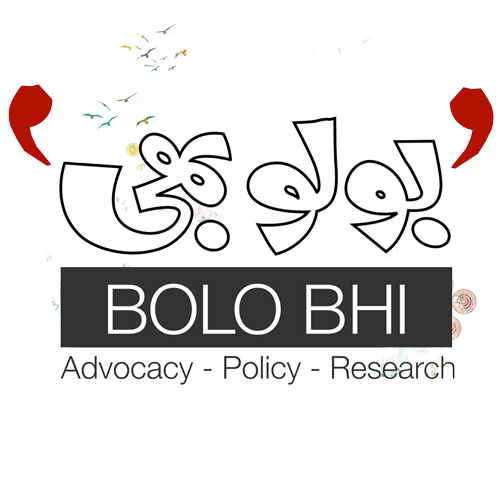 Bolo Bhi are a digital campaigning group who have orchestrated an impressive ongoing fight against attempts to censor the internet in Pakistan. The all-women management team have launched internet freedom programmes, published research papers, tirelessly fought for government transparency and run numerous innovative digital security training programmes.
Bolo Bhi are a digital campaigning group who have orchestrated an impressive ongoing fight against attempts to censor the internet in Pakistan. The all-women management team have launched internet freedom programmes, published research papers, tirelessly fought for government transparency and run numerous innovative digital security training programmes.
 Belarus Free Theatre, co-founded by Natalia Kaliada, have been using their creative and subversive art to protest the dictatorial rule of Aleksandr Lukashenko for a decade. Despite pressure from authorities since their inception, the group thrived underground, with performances in apartments, basements and forests despite continued arrests and brutal interrogations. In 2011, while on tour, they were told they were unable to return home. Refusing to be silenced, the group set up headquarters in London and continued to direct projects in Belarus.
Belarus Free Theatre, co-founded by Natalia Kaliada, have been using their creative and subversive art to protest the dictatorial rule of Aleksandr Lukashenko for a decade. Despite pressure from authorities since their inception, the group thrived underground, with performances in apartments, basements and forests despite continued arrests and brutal interrogations. In 2011, while on tour, they were told they were unable to return home. Refusing to be silenced, the group set up headquarters in London and continued to direct projects in Belarus.
This year, the Index awards gala on 13 April will be hosted by stand-up comedian and writer Shazia Mirza, whose outspoken and taboo-busting comedy explores Islamic fundamentalism and women’s rights. Mirza is fresh from her sell-out London run and in the midst of her current UK tour.
This article was published on 8 March 2016 at indexoncensorship.org
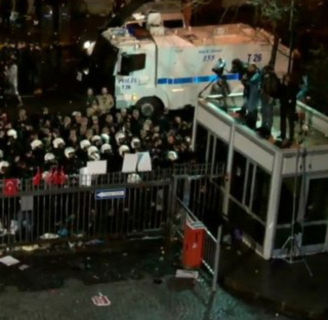 On Friday night, security forces stormed Zaman, the widest-circulating Turkish newspaper. Though many Turkish news outlets studiously avoided covering the raids, the screens of international news channels were full of images of Turkish police using tear gas and water cannon against protestors trying to protect their paper. Particularly striking were the injuries to young women wearing Islamic headgear, the very segment of the community, which the ruling Justice and Development Party (AKP) once vowed to defend.
On Friday night, security forces stormed Zaman, the widest-circulating Turkish newspaper. Though many Turkish news outlets studiously avoided covering the raids, the screens of international news channels were full of images of Turkish police using tear gas and water cannon against protestors trying to protect their paper. Particularly striking were the injuries to young women wearing Islamic headgear, the very segment of the community, which the ruling Justice and Development Party (AKP) once vowed to defend.
The seizure of a news organisation by placing it into court-appointed administration is not trivial. The Zaman group employs some two thousand people, runs a nationwide network of correspondents and puts out an English language daily, Today’s Zaman, which has an international following on the web. It is impossible to imagine a court in any country with the slightest pretension of being democratic acting with such impunity.
The final headline of the independent version of Zaman was that there could be no legal basis for the takeover. Indeed, Article 30 of the Turkish Constitution reads: “A printing house and its annexes, duly established as a press enterprise under law, and press equipment shall not be seized, confiscated, or barred from operation on the grounds of having been used in a crime.” (As amended on May 7, 2004; Act No. 5170)”
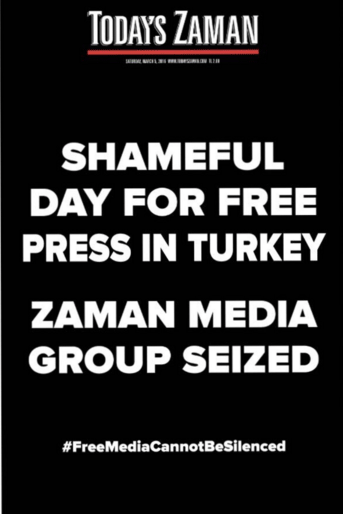 It is no secret that Zaman demonstrated fidelity to the movement associated with the exiled cleric, Fethullah Gülen. The paper once supported the rise of AKP but in recent years has been a bitter critic. The legal document, which placed Zaman’s parent company into court-appointed administration, relies on the testimony of an anonymous witness who maintains that the editorial policy was dictated by what it calls the Fethullah Terror Organisation (FETÖ in its Turkish acronym). This in turn is guilty of conspiring with the outlawed Kurdistan Workers Party (PKK). It is enough to point out that the existence of FETÖ is at best hearsay, at worst the invention of subeditors in the pro-government press – never mind that Zaman itself once took a more hawkish line towards the PKK than the government itself.
It is no secret that Zaman demonstrated fidelity to the movement associated with the exiled cleric, Fethullah Gülen. The paper once supported the rise of AKP but in recent years has been a bitter critic. The legal document, which placed Zaman’s parent company into court-appointed administration, relies on the testimony of an anonymous witness who maintains that the editorial policy was dictated by what it calls the Fethullah Terror Organisation (FETÖ in its Turkish acronym). This in turn is guilty of conspiring with the outlawed Kurdistan Workers Party (PKK). It is enough to point out that the existence of FETÖ is at best hearsay, at worst the invention of subeditors in the pro-government press – never mind that Zaman itself once took a more hawkish line towards the PKK than the government itself.
According to reports reaching P24, the prosecutor struggled to find a court which would accede to his request. The Zaman building is in the Bakırköy province of Istanbul and comes under its jurisdiction. However, the request in the Bakırköy court was refused. Finally another, more friendly court acceded to the prosecutor’s demand, even though it is dubious whether it had the competence to do so.
The paper may not be guilty of treason but is has been guilty of apostasy – of having turned its back on AKP and President Tayyip Erdoğan in particular. Since then the two have been in mortal combat. Loyalists to the Gülen movement and the Zaman group in particular pursued corruption allegations against leading government officials in December 2013.
By forcing Zaman’s takeover the government lays itself open to universal condemnation. Turkey, once a proud EU applicant, now plumbs the lower depths of global rankings of transparency and free expression. Sadder still, this does not seem to trouble it a jot.
“The timing is a slap in the face,” according to a diplomat quoted in The Financial Times. “The seizure came during a visit to Istanbul by Donald Tusk, the European Council president, and two days before Angela Merkel, the German chancellor, is to see Ahmet Davutoğlu, the Turkish premier,” the paper points out. Turkey now calibrates its place in the world not as a democratic standard bearer in a troubled part of the globe but as a buffer zone between Fortress Europe and a tide of Syrian refugees. This, it believes, gives it licence to get away with the murder of a newspaper.
In Turkey all eyes, government and opposition, are on the EU to see if Brussels is prepared to put expediency above principle and if European pubic opinion is prepared to see Ankara give up all pretence of democratic governance in exchange for grudging cooperation on Syria.
It is not just the timing of the EU summit, which is significant. The Constitutional Court recently gave the presidential office a swift kick in the shins with the release from pre-trial detention of the editor-in-chief of Cumhuriyet newspaper along with his Ankara bureau chief. The high court ruled that the charges against them – that printing stories in a newspaper could correspond to treason – were essentially absurd. Since then, newspapers and ministers loyal to the president have been braying for the judges’ blood. The president himself has said he would neither respect nor abide by the high court’s decision and now appears even more determined to draft a new constitution which would allow him to do exactly that.
Not everyone in AKP supports this autocratic trend. There is a small wave of discontent from the old guard who believe a constitution that concentrates even greater powers in presidential hands is a dangerous step. These homegrown dissidents took quiet satisfaction in the court’s defence of Cumhuriyet. So one can see the raid against Zaman as the president re-asserting his authority against these pockets of resistance to one-man rule.
Turkey’s 1982 Constitution was prepared under conditions of martial law. It attempted to dictate a society in which the rights of citizen were subservient to the needs of the state. This rendered it anachronistic before the ink on the Official Gazette was dry. It has constantly been rewritten and there have been consistent demands that it be replaced.
Yet no one, not even in their wildest babblings, ever claimed the current Constitution was insufficiently authoritarian, or that it ceded too little power to the arbitrary whim of government, or that it failed to enshrine the Machiavellian principle that “might makes right”.
No one, that is, until now. As the ink on the printing presses of Turkey’s independent media run dry so too do hopes for the country’s future.
See also:
Statement: Index condemns seizure of Zaman
Sign our petition: End Turkey’s crackdown on press freedom
Letter: Writers and artists condemn seizure of Zaman news group
Reaction: Turkish court orders seizure of Zaman news group
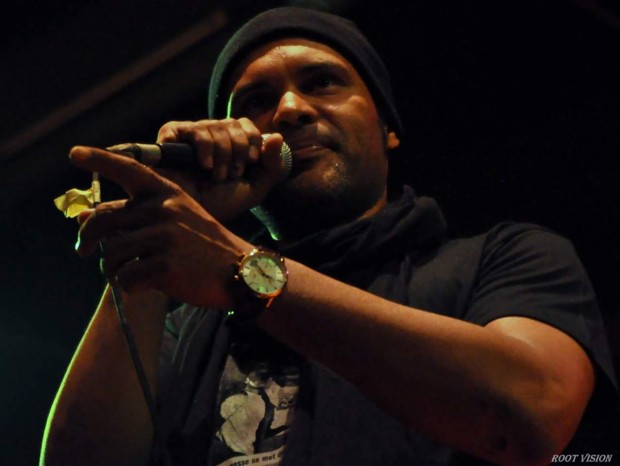
Serge Bambara, aka Smockey, is a hip-hop artist, producer and activist within Le Balai Citoyen, or the Citizen’s Broom, a grassroots political movement seeking change in Burkina Faso. His music fuses hip-hop with traditional Burkinabe music, to critique and satirise government corruption, the lack of democracy, poverty and prejudice against women within the country.
His acclaimed Studio Abazon was fire-bombed in September 2015 in retaliation for his role in the ending of the 27-year tenure of former President Blaise Compaoré. Smockey has no doubt the attack was an attempt on his life in revenge for his activism. Thankfully the rapper was in hiding at the time and was unharmed.
Index on Censorship has named Smockey as the inaugural recipient of the Music in Exile Fund Fellowship. As the beneficiary, he will perform live in London, as well as receive training and opportunities to connect with other free speech heroes around the world. Smockey is committed to getting his studio up and running again and creating more music. Here’s just a snippet of his work as a musician and producer.
Smockey – Votez Pour Moi
Votez Pour Moi (Vote for Me) was released at the time of the 2005 presidential elections in Burkina Faso. It is about the dire state of democracy in the country. “This song is very ironic and satirical,” says Smockey. “In it, I play the role of a dictator making many promises he doesn’t intend to keep.” Dictators aren’t known for their sense of humour, but so out of touch was Compaoré’s government that they actually used Votez Pour Moi in their political campaign, playing on the TV every day.
“They didn’t listen to the lyrics and so didn’t realise it was a joke at their expense. Being in power for 30 years, they could only think of themselves,” Smockey told Index on Censorship.
Smockey – A Qui Profite le Crime
The title of this track translates as: who benefits from the crime? It is about the assassination of Thomas Sankara, the revolutionary president of Burkina Faso from 1983 until his assassination in 1987. Smockey is a self-proclaimed Sankarist, a left-wing ideology in the tradition of Sankara, who was murdered during a coup d’état organised by Compaoré.
The opening lines of the song, translated from their original French, are as follows: “So everything was planned from the beginning / For the country, but the finish is death we were served; routine investigation / Who benefits? Who benefits from the cime? / Who knows? / We were misled.”
Smockey – Tomber la Lame
Tombre la Lame (Falling Blade) is a song about female genital mutilation, a practice still common in Burkina Faso. “It happens as a result of local traditions and customs, and also religion, namely Islam,” explained Smockey. “It’s a very bad practice; women get hurt and go on to have complications later in life, such as when giving birth.” FGM is a major problem in West Africa in general, and Smockey wants to “convince people that they have to stop it”. Sankara was committed to women’s rights during his brief time in power and outlawed FGM, among other things. “When Sankara was killed, progress on this front was stopped in its tracks, so we have to continue the fight,” said Smockey.
Smockey – A Balles Reelles
In 2008, students in Ouagadougou, the capital of Burkina Faso, faced severe hardship following the sudden eviction from their halls of residence, the closure of essential facilities and the cancellation of welfare payments without notice. Authorities took the action following confrontations between students and police on 22 June 2008.
Balles Reelles, which translates as “real bullets”, is a song criticising the authorities for their harsh treatment of young people. At a press conference, Smockey and his collaborator on the track, the reggae artist Sams’K Le Jah, also criticised the passivity of the students’ parents in the face of the harsh treatment of their children. “Parents are silent when the university is closed and some students have become vulnerable,” Le Jah said.
Les Ambassadeurs de la Liberté d’Expression – Le Droit de Vivre
Les Ambassadeurs de la Liberté d’Expression, or the Ambassadors for Freedom of Expression, is a collaborative project effort including Smockey and other musicians from west Africa who are committed to strengthening freedom of expression in the region. Le Droit de Vivre (The Right to Live) was recorded at Studio Abazon before it was bombed. It is a song against extremism and injustice.
Other artists in the project include Didier Awadi of Senegal, Sissao, Alif Naaba from Burkina Faso, and Marechal Zongo, Josey and Soum Bill from Côte d’Ivoire, among others.
“Not everyone is lucky enough to have a microphone in front of them, so if you have the chance to talk, you have to say something important,” Smockey said of the project. “Art doesn’t just have to be beautiful – it can be beautiful and useful at the same time.”
Index on Censorship has teamed up with the producers of an award-winning documentary about Mali’s musicians, They Will Have To Kill Us First, to create the Music in Exile Fund to support musicians facing censorship globally. You can donate here, or give £10 by texting “BAND61 £10” to 70070.